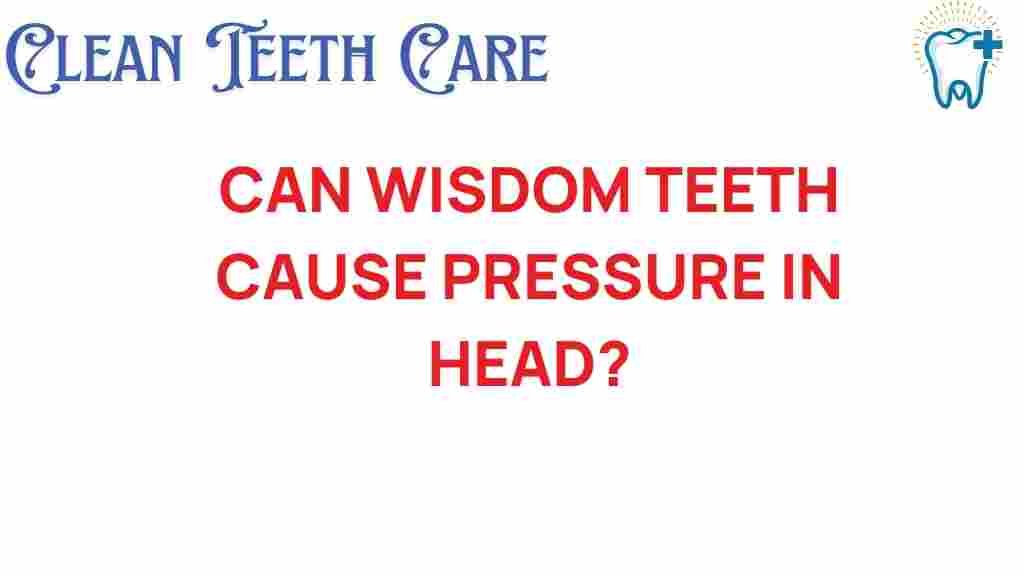Wisdom Teeth and Head Pressure: Unraveling the Connection
Wisdom teeth, often regarded as the final set of molars, typically emerge in late adolescence or early adulthood. While they are a natural part of dental development, many people experience complications associated with their eruption. One of the less commonly discussed issues is the connection between wisdom teeth and head pressure. In this article, we will explore how wisdom teeth can lead to head pressure, the symptoms involved, and effective pain relief options.
Understanding Wisdom Teeth
Wisdom teeth usually appear between the ages of 17 and 25. For some individuals, these teeth can grow without complications, while for others, they can become impacted, meaning they do not have enough space to emerge properly. This can lead to various dental health issues, including:
- Infection
- Cysts
- Damage to neighboring teeth
- Jaw discomfort
As wisdom teeth push against adjacent teeth, they can create tension in the jaw and surrounding areas, leading to head pressure and pain. Understanding these connections is crucial for maintaining oral care and overall health.
Symptoms of Wisdom Teeth Complications
Recognizing the symptoms associated with wisdom teeth can help in identifying issues before they escalate. Common symptoms include:
- Pain or discomfort in the back of the mouth
- Swelling around the gums
- Dull or sharp head pressure
- Jaw stiffness or pain
- Headaches
- Difficulty in opening the mouth
If you experience any of these symptoms, it is essential to consult with a dental professional to assess your dental health and determine the appropriate course of action.
The Connection Between Wisdom Teeth and Head Pressure
Head pressure resulting from wisdom teeth issues is often linked to the following factors:
- Impaction: When wisdom teeth do not have enough space to emerge, they can push against other teeth and nerves, leading to pain and pressure.
- Infection: Impacted wisdom teeth can become infected, causing swelling and inflammation that radiate to the head and neck.
- Jaw Discomfort: The discomfort in the jaw can lead to muscle tension, which may result in headaches and a feeling of pressure in the head.
These factors highlight the importance of health awareness regarding wisdom teeth and their potential complications.
Step-by-Step Process for Managing Wisdom Teeth Pain
If you suspect that your wisdom teeth are causing head pressure, follow these steps for managing your symptoms:
- Consult a Dentist: Schedule an appointment with your dentist to evaluate the condition of your wisdom teeth.
- Undergo X-rays: Your dentist may recommend X-rays to assess the positioning of your wisdom teeth and determine if they are impacted.
- Discuss Treatment Options: Based on the evaluation, your dentist may suggest various dental treatments, including extraction if the teeth are problematic.
- Follow Pre- and Post-Operative Care: If extraction is necessary, follow your dentist’s pre- and post-operative instructions carefully to ensure proper healing and minimize discomfort.
Effective Pain Relief for Wisdom Teeth Discomfort
Managing pain associated with wisdom teeth can significantly improve your quality of life. Here are some pain relief options:
- Over-the-Counter Pain Relievers: Medications such as ibuprofen or acetaminophen can help alleviate pain and reduce inflammation.
- Cold Compress: Applying a cold compress to the outside of your jaw can help reduce swelling and numb the pain.
- Saltwater Rinse: Rinsing your mouth with warm salt water can promote healing and reduce pain.
- Clove Oil: This natural remedy can be applied to the affected area to numb pain and reduce inflammation.
Always consult with your dentist or healthcare provider before starting any new pain relief regimen to ensure it is safe and appropriate for your situation.
Troubleshooting Tips for Managing Symptoms
If you experience ongoing symptoms related to wisdom teeth, consider the following troubleshooting tips:
- Monitor Symptoms: Keep track of your symptoms and their severity to provide your dentist with detailed information during your appointment.
- Maintain Oral Hygiene: Continue practicing good oral care by brushing and flossing regularly, especially around the impacted area.
- Avoid Hard Foods: Stick to soft foods to minimize jaw discomfort and irritation of your wisdom teeth.
- Stay Hydrated: Drink plenty of water to help flush out bacteria and support your overall health.
By implementing these tips, you can help mitigate the discomfort associated with wisdom teeth while awaiting professional dental treatment.
Dental Treatments for Wisdom Teeth Complications
When wisdom teeth cause significant issues, several dental treatments may be recommended:
- Extraction: The most common treatment for problematic wisdom teeth is extraction. This procedure can be done under local or general anesthesia, depending on the complexity.
- Antibiotics: If an infection is present, your dentist may prescribe antibiotics to help control the infection before or after extraction.
- Dental Surgery: In cases where wisdom teeth are severely impacted, surgical intervention may be necessary to safely remove the teeth.
Each treatment option should be discussed with your dentist, who will consider your specific dental health needs and preferences.
Conclusion
The connection between wisdom teeth and head pressure is a significant concern for many individuals. Understanding the symptoms, causes, and effective pain relief options is vital for managing discomfort and maintaining dental health. Regular dental check-ups and health awareness can help address issues before they escalate into more serious complications.
If you suspect that your wisdom teeth are causing you discomfort, don’t hesitate to seek professional dental care. Early intervention can make a significant difference in your oral care journey, ensuring a healthier future for your smile. For more information on dental health and treatments, you can visit the American Dental Association.
Remember, taking care of your wisdom teeth is not just about relieving head pressure but also about ensuring your overall health and well-being.
This article is in the category Conditions and created by CleanTeethCare Team
